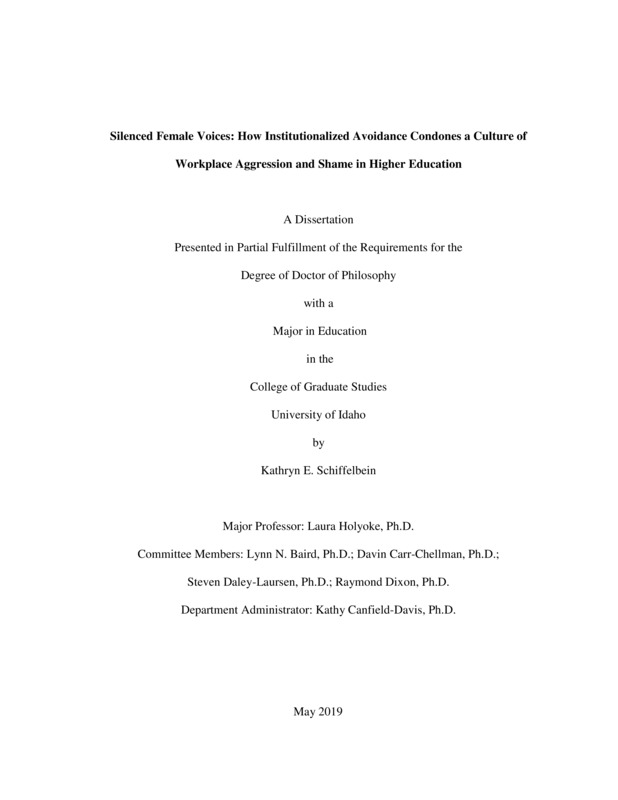Silenced Female Voices: How Institutionalized Avoidance Condones a Culture of Workplace Aggression and Shame in Higher Education
Schiffelbein, Kathryn. (2019-05). Silenced Female Voices: How Institutionalized Avoidance Condones a Culture of Workplace Aggression and Shame in Higher Education. Theses and Dissertations Collection, University of Idaho Library Digital Collections. https://www.lib.uidaho.edu/digital/etd/items/schiffelbein_idaho_0089e_11554.html
- Title:
- Silenced Female Voices: How Institutionalized Avoidance Condones a Culture of Workplace Aggression and Shame in Higher Education
- Author:
- Schiffelbein, Kathryn
- Date:
- 2019-05
- Embargo Remove Date:
- 2021-07-10
- Keywords:
- female professional staff higher education institutionalized avoidance shame shame resilience workplace aggression and bullying
- Program:
- Leadership and Counseling
- Subject Category:
- Education
- Abstract:
-
Numerous studies describe the harsh realities of workplace aggression. Many of these studies originated in Scandinavia and Australia, but in recent years research in workplace aggression has increased in the U.S. Researchers attribute workplace aggression to negative emotional, physical, and psychological outcomes. More recently, researchers studied workplace aggression in higher education populations such students, faculty, and administrators, however, research on professional staff is insufficient. In this three-manuscript dissertation study, I explored the lived adverse interpersonal experiences of female professional staff in higher education and discovered how they moved through the experiences. I offer an alternative to the male “normal experience” through a feminist post-intentional phenomenological lens of female professional staffs’ experiences with workplace aggression in higher education. Tentative manifestations, or themes, and discussion provide insight to the female lived experiences of workplace aggression and shame in higher education. I found the participants’ experiences included different types of workplace aggression: incivility, bullying, harassment, and emotional abuse. As a result, female professional staff felt elements of shame such as being trapped, powerless, and isolated. I explored how the participants moved through their experiences utilizing components of shame resilience. The majority of participants’ voices were silenced as they reached out for help. Their institutional representatives avoided reports of bullying and abuse, consequently silencing and shaming their voices. The results of this study contribute to the literature on higher education organizational culture, workplace aggression, feminist phenomenology, and shame resilience theory.
- Description:
- doctoral, Ph.D., Leadership and Counseling -- University of Idaho - College of Graduate Studies, 2019-05
- Major Professor:
- Holyoke, Laura
- Committee:
- Baird, Lynn N; Carr-Chellman, Davin; Daley-Laursen, Steven; Dixon, Raymond
- Defense Date:
- 2019-05
- Identifier:
- Schiffelbein_idaho_0089E_11554
- Type:
- Text
- Format Original:
- Format:
- application/pdf
- Rights:
- In Copyright - Educational Use Permitted. For more information, please contact University of Idaho Library Special Collections and Archives Department at libspec@uidaho.edu.
- Standardized Rights:
- http://rightsstatements.org/vocab/InC-EDU/1.0/

